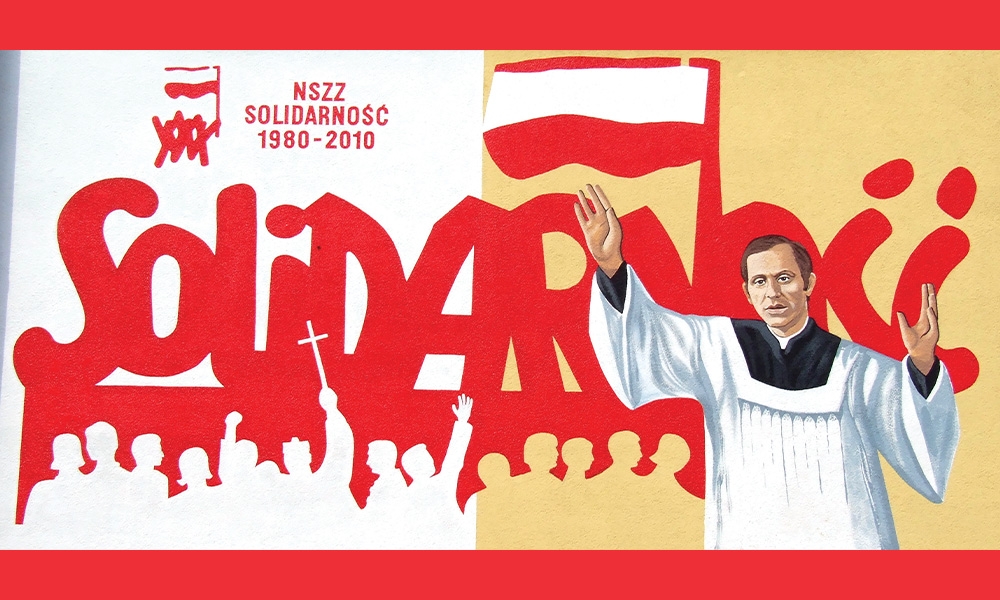
Solidarity
The sixth of our seven themes of Catholic social teaching regards “solidarity.” Those of you who are older than 40 might remember the word “solidarity” as the slogan of the Polish political movement led by Lech Walesa, which overthrew communism in that Eastern European country. Solidarity is that firm belief that one must understand oneself in context to one’s responsibility for others and work in a dedicated way for the common good. Concepts of solidarity were central themes in the writings of St. John Paul II and many other popes:
Solidarity is not a feeling of vague compassion or shallow distress at the misfortunes of so many people, both near and far. On the contrary, it is a firm and persevering determination to commit oneself to the common good; that is to say, to the good of all and of each individual, because we are all really responsible for all.
(St. John Paul II, On Social Concern [Sollicitudo rei Socialis], 38)
The sixth of our seven themes of Catholic social teaching regards “solidarity.” Those of you who are older than 40 might remember the word “solidarity” as the slogan of the Polish political movement led by Lech Walesa, which overthrew communism in that Eastern European country. Solidarity is that firm belief that one must understand oneself in context to one’s responsibility for others and work in a dedicated way for the common good. Concepts of solidarity were central themes in the writings of St. John Paul II and many other popes:
Solidarity is not a feeling of vague compassion or shallow distress at the misfortunes of so many people, both near and far. On the contrary, it is a firm and persevering determination to commit oneself to the common good; that is to say, to the good of all and of each individual, because we are all really responsible for all.
(St. John Paul II, On Social Concern [Sollicitudo rei Socialis], 38)
Recently, we have seen many reports in the news that tell us that the fastest-growing religious group in the United States is the “nones,” those who do not identify with any specific religion. They tell us that they do not value the sense of “conformity” that they feel is imposed by organized religion. While that can be understandable, it can also be that “belonging” and “responsibility for others” can be challenging to our individual pleasures and egocentric conveniences. Solidarity requires that a person have a true concern and responsibility for the welfare of others. This cannot be accomplished without a measure of sacrifice. For this reason, our Lord Jesus Christ, after witnessing to us by His Passion, death, and resurrection, incorporated all of His followers into a Church with the mystery of Pentecost. It was at Pentecost when the followers of Christ came to understand fully that they were connected intimately to one another as members of the Mystical Body of Christ, and that they were no longer simply individuals following the same teacher.
St. John the Apostle, in his first letter, tells us: “The love of God in us is witnessed to by our willingness to lay down our lives for others as Christ did for us.” (1 Jn 3:16-18) As members of the Church, the Mystical Body of Christ, it is profoundly important for us to live in solidarity with our neighbors, seeking the common good not only with words and wishes, but with actions and sometimes with self-sacrifice. So many are rejecting the good of belonging to the Church because they do not see and understand how being a member of the Body of Christ changes things. Each one of us who understands our role as a member of the Church can give profound witness to the Christian solidarity that makes each of us responsible for the good of the other.
Father John G. McDonald is currently pastor of Sacred Heart of Jesus Catholic Church in Anniston. He was principal and then president of John Carroll Catholic High School from 2008 to 2016, and he served as the Carl J. Peter Chair of Homiletics at the Pontifical North American College in Rome from 2016 to 2019.



